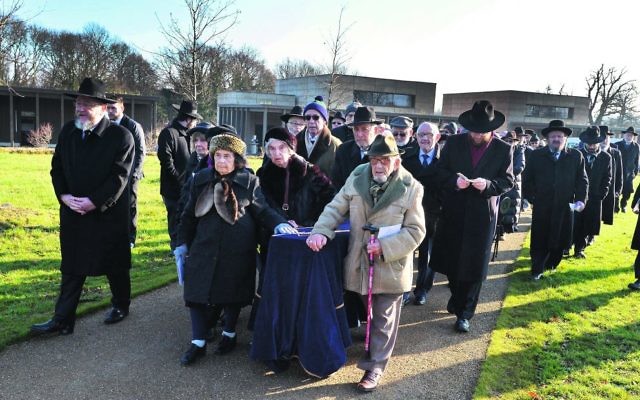Unknown Shoah victims finally laid to rest
Each mourner had their own profound reasons for being at the United Synagogue's New Cemetery in Bushey, Hertfordshire, on Sunday morning to witness the burial of six unknown Jews murdered in Auschwitz.

EACH mourner had their own profound reasons for being at the United Synagogue’s New Cemetery in Bushey, Hertfordshire, on Sunday morning to witness the burial of six unknown Jews murdered in Auschwitz.
For the 50 survivors in attendance, many of whom escorted the tiny coffin containing the bones and ashes of five adults and a child to its final resting place, this was a moment 73 years in the making – a chance to finally, symbolically, grant their mothers and fathers, brothers and sisters the burial they were denied.
Others among more than 1200 mourners, inside two overflowing prayer halls and outside in the chilly January air, were there to bear witness to a pivotal moment in post-Holocaust history – Britain’s first public funeral for Shoah victims.
The remains had been stored for two decades by the Imperial War Museum after being donated by an unnamed individual – believed to be a survivor. After testing confirmed they were adult and child remains, the museum contacted Chief Rabbi Ephraim Mirvis who recommended swift burial.
Attendees, including the Archbishop of Westminster Vincent Nichols, Israel’s ambassador to the UK Mark Regev, Communities Secretary James Brokenshire and Lord Lieutenant Robert Voss as the official representative of the Queen, heard Dayan Ivan Binstock begin the service with a specially written eulogy entitled ‘Six Of Our Millions’.
He asked, “Whose ashes are you? From where have you come? How is it possible to articulate our pain? For the ashes of our families, for the dust of our communities. For the broken tables of our people.
“The remnants of our youths and elders, our brides and grooms, our sons and daughters, our rabbis and our leaders, our schoolmasters and schoolmistresses, our parents and infants. After 70 years you have come to rest – perhaps your place can begin to comfort us.”
In a deeply poignant address which moved many to tears, Rabbi Mirvis spoke personally to the infant among the six, saying, “Your childhood was robbed. You experienced such fear and dread, then the ultimate wickedness saw your life taken. We don’t know who you are, your name, if you were male or female or the details of your family. But we do know you were Jewish. All of us here feel a strong connection to you.
“We remember you every day of our lives. You give us constant inspiration. You represent more than one million other children who were murdered. We have been given the privilege to show you dignity here at your funeral.”
Rabbi Mirvis added, “Here today is the ambassador of Israel. When you went to your death you wouldn’t have believed such a post could exist – the ambassador of the Jewish State. When you were sent to your death there was no light at the end of your suffering. Yet only three years after the Holocaust, the State of Israel was born.”
Lily Ebert, whose mother and siblings perished at Auschwitz, attended thanks to Jewish Care UK’s Holocaust Survivors Centre, which arranged for many of the survivors to be there.
She said, “For our parents, children, babies, not only did they [the Nazis] take our lives but they didn’t even let us have a burial. Now we have something that is very important to us.”
Survivor Agnes Grunwald-Spier, an author and historian born in Budapest in 1944, said she believes her grandfather was killed at Auschwitz but her family has not been able to find the truth.
“In a way these people represent all those millions who have no grave and whose families can’t mourn them properly because they don’t know what happened to them,” she said.
Michael Goldstein, president of the United Synagogue, said, “This can only be described as the ultimate act of kindness, chesed shel emet in Hebrew, because, as with all burials, nobody can be thanked for what you’ve done. We have the opportunity to do what was denied to our brothers and sisters during the Holocaust: to provide a dignified and appropriate Jewish burial.”
Ahead of last weekend’s ceremony, Prince Charles sent his “heartfelt condolences” to the community. The heir to the throne, who is patron of the Holocaust Memorial Day Trust, wrote to Rabbi Mirvis saying, “I just wanted to write to say how moved I was to hear about the arrangements being made to provide a dignified and final rest to six victims of the Holocaust.
“It appears that, tragically, we will never know their names, the family and community who nurtured them, nor the kind of lives they lived before their imprisonment and murder. Yet we can say with certainty that, along with millions of other victims of the Shoah, they were denied their very humanity.”
RICHARD FERRER, UK JEWISH NEWS

comments